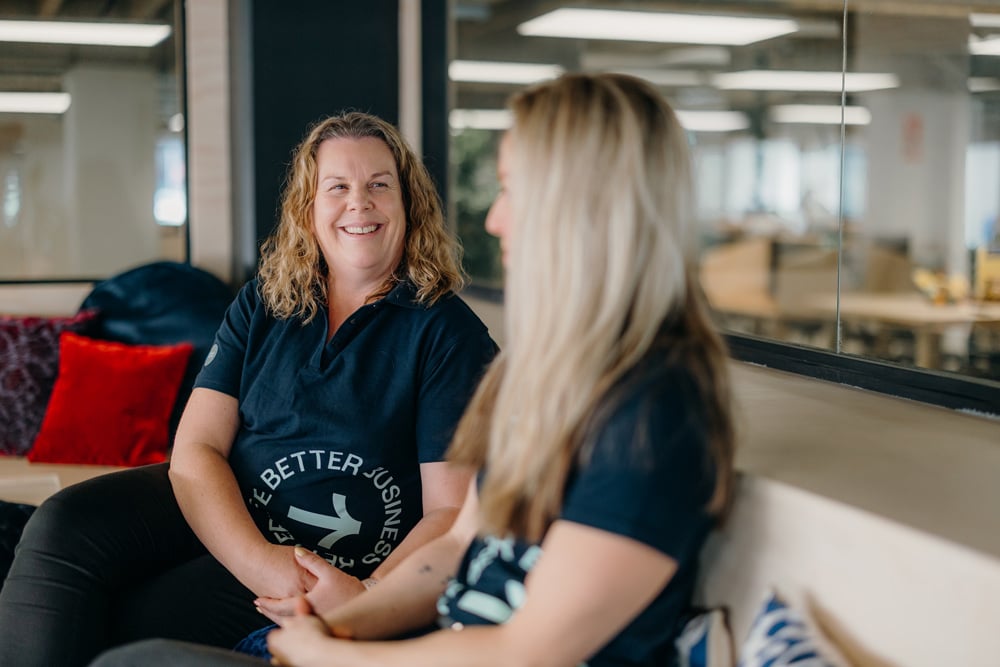Marketing can feel a bit daunting for a small business, but there are many ways to market your business that don’t necessarily require deep expertise. Marketing is an important part of all small businesses - but varies greatly depending on the nature of your business, objectives and industry. In this article we offer some tips for marketing your business, whether you’re just getting started or are already established but haven’t yet focused directly on marketing.
Research your industry
Research is such a powerful tool you can use to make decisions about your marketing activity. It’s also an important step to ensure your offering is competitive and differentiated from others. Many revelations come from a bit of homework on what the competition is doing, but also other elements of the industry, including what your target customers are talking about.
We appreciate that for most, time to ‘research’ might feel impossible to commit to, but research doesn’t need to be a huge chore done all at once.
Here’s some ways to get started researching your industry:
-
Jump on Google and do some basic searches for your offering (generic terms). Review the top 10 results and visit each website. Make notes on their offering, how it’s positioned, benefits, how they talk about the customers’ needs, gaps they’re not filling and other details of interest. Gather this information up and use it to start informing any changes you might make to your business model, website or marketing materials to get a step up on the competition.
-
Jump on social media and find groups that relate to your offering (e.g. a group dedicated to golfing gear that would help a golf supplies business understand trends or challenges). Here you’ll find communities of people that represent your target customer, or other business owners who can share ideas and connect. There’s some real value in finding out common themes that are discussed that you can think about incorporating into your marketing - whether that’s some information you add to your website, or a more fundamental change to how you position your offering.
-
Access any publicly available research. Statistics and data exist on the web in many different forms. While they won’t necessarily be 100% perfectly dialled into your target market, there will be insights to gain.
-
Google Keyword Planner - do you run Google ads for your business’ website? If you are spending with the platform you’ll get some useful data around monthly search demand for various topics. This data also shows trends around growth in demand (or reduction) for search queries. This can help make decisions about what services or products need to be promoted more or less.
-
Ask your existing customers. First party research is golden for really insightful, qualitative data. Just make sure to not mistake your own database for an accurate sample of the entire market you’re operating in. Decisions to date could skew your customers in a certain direction. With that said, they are customers for a reason, and determining what these attributes are can help make smart targeting decisions with your marketing. Some digital platforms even allow you to build similar audiences based on your current customers (with some conditions). Beyond the value you get as a business, it’s a good opportunity to demonstrate to your customers that you care what they think and may be taking steps to provide an even better service.
We’ve only scratched the surface with market research - there are dedicated agencies that can help you further, although these come at a cost. Making use of the data that’s free or cheap to obtain is a good starting point.
Write a basic marketing plan
Marketing plans and strategies vary wildly from business to business. Many don’t have a well-articulated plan, or any plans at all. And while at a certain size it might feel like this is surplus to requirements, we’d suggest all businesses create one simply to refer back to later and help make decisions.
A basic marketing plan should aim to:
-
Outline clearly the goals of marketing (why are we doing this)
-
Identify your customer / audience / market opportunities - what are the different personas or groupings of customers we’re trying to target?
-
State the unique selling points of your business
-
Outline the products and services you wish to push as priority
-
Define the SWOT analysis or similar - where is the business strong or weak, where are there opportunities or threats/risks?
-
Create the channel mix (e.g. newspaper, search engine marketing)
-
Detail the tactics that will be used, and how channels will be used together
-
Map out the overall budget and a by-channel budget
-
Provide a timeline of activity
-
Confirm Metrics/Key Performance Indicators - what will we measure to know if this is working?
This might feel like a lot - but as a starting point you don’t need to go too deep into each area until you’ve started trying some things. You can update your marketing plan once you’ve had some real world learnings. Your first marketing plan might only be a couple of pages. It should represent what the business is going to do, and everyone who’s involved in actioning your marketing plan should understand it clearly - if not contribute to its development. If you’re a sole trader looking to do your own marketing, you simply need to have a plan that makes sense to you and is realistic to execute in the timeframe set.
Become a commentator on your specialist subject
Marketing doesn’t need to involve spending money on campaigns every time. Some of the best marketing happens through building your personal profile within your industry and beyond. You may have read articles in the news where experts are quoted with their input on a topic - these experts are often from businesses, who see this as a great way to build up their profile and the business they represent as being knowledgeable and trustworthy on the topic.
The road to becoming an industry commentator that is sought after happens gradually, but you can start building up you or your people as experts by:
-
Publishing blogs on your website about a topic with the author clearly pictured and named
-
Create videos about topics and share these across social media and YouTube
-
Build a plan to share thoughts and ideas 2-3 times a week on channels like LinkedIn where a lot of people go to stay up to date
-
Contribute to other threads online with your thoughts
-
Host or attend industry events and get speaking engagements
Over time, this momentum will build and you could find yourself with opportunities to speak to a wider audience and promote your business organically in the process. Of course the magic ingredient to this marketing working is to genuinely be an expert in your field - so keep learning as part of your weekly rituals!
Create a website that’s easy to navigate - and get in touch with you
Websites are your digital business card at the very least. For a retail/product business they’re often a critical channel for sales. The cost of a great website that performs well will often be far less than the lost sales of having a poor user experience. There’s a number of considerations that you’ll want to make with a website to ensure it’s a powerful marketing tool:
-
Design - the visual elements of your website including photography, graphics and even spatial layout can all infer to customers. They say first impressions count, and it’s certainly true in the context of a business’ website. Many visitors will be comparing your site to others’, so it needs to immediately feel like a website of a business that knows what they’re doing.
-
Performance - websites need to load quickly for all users, no matter if they’re on a computer or phone, in the middle of the CBD or out in the country. Make sure that your website is built on a platform (or content management system - CMS) that facilitates quick loading. It’s sometimes a balancing act of having the visually impressive elements with a site that’s snappy. An experienced web development partner should be able to support you to achieve good performance.
-
Clear copy - copy is a living, breathing element to your website that will likely be refined over the years. You should always strive to tell a clear, concise story on main landing pages, but not be afraid to go into more detail on sections where visitors might want to learn more (such as a blog about how your product works). Your home page should give users total confidence that they’re arrived in the right place; prioritise addressing their needs in your messaging first, then talk about yourself second.
-
Make contacting you really easy - unfortunately in the era of trying to push people through digital-only channels in our view makes customer experience suffer. It’s our view that customers should be able to contact you via the method that suits them the best. Of course you may have some preference on what channel is used depending on the query, in which case you’ll want to think carefully about the placement of contact forms, email addresses and phone numbers. As a small business still growing your reputation, we’d err on the side of being more helpful to prospective customers through your contact channels than opting for absolute operational efficiency before the business genuinely warrants it.
There’s much more to a great website, including optimisation for search engines, user experience testing and information architecture. For now, focus on what you want to say, what you want visitors to do and the impression that you give through the design. A web partner can help guide you through other considerations.
Experiment with some light search ads
Search engines are one of the most qualified sources of traffic to your website that you can hope for. There’s a simple explanation for this - the user is actively looking for what you have to offer. Using Google Ads, you can target specific keywords that align with your business, and write ads to show when they do. You then set a budget you want to spend (typically daily) and will start to get clicks on your ad that takes the user onto a landing page of your website.
Start out by setting up your Google Ads and run one small campaign, using Google’s tutorial. Once you get a bit of history in the account, you can start to build more ad groups and campaigns for different parts of your business. By starting slow, you can learn what terms are working best without spending too much. The goal in Google Ads to to write the best ad, create the best landing page, and bring your ‘cost per click’ down in the process - Google determines how much you pay based on competition and a ‘Quality Score’ - the more relevant/quality of a result you are, typically the cheaper a click will be for you.
Give your brand a boost with digital awareness advertising
Search advertising is often used to bring in potential customers who are closer to converting into business - that is, those who used search terms that suggest they’re ready to take action. But marketing doesn’t just happen at this moment - there’s a need to simply make the market aware of your business, even when they’re not actively looking for anything. Awareness marketing in traditional contexts are things like billboards. Digitally, awareness activity is reasonably accessible for even the most modest of budgets. Here are some examples of digital channels you can run advertising about your business:
-
Google Display banner ads
-
YouTube video ads
-
Facebook ads
-
Instagram ads
These ads will be a mixture of text, static images, videos and other elements - each channel has different requirements and steps to building ads, so do some research first.
Aim to meet one new person a week in your industry
While not strictly a ‘marketing’ practice as much as building up your network, the reality is that for many businesses the best source of new work is through referrals. Don’t be an island in your industry - regularly meet with others who you can bounce ideas around with and create some lasting relationships. Even ‘competitors’ are made up of businesses that may want to send each other customers at certain times.
You do want to make sure you’re not divulging information to direct competitors - so do pick who you meet with carefully. It may be that those you meet with in the industry may do the same work, but have a different customer profile - such as larger projects, meaning they’ll send you smaller jobs that your business is set up to accommodate.
Make use of shared working spaces
Another way to build up good relationships with other businesses (both in your industry and complementary ones) is to situate in a shared or ‘co-working’ space. These spaces create many opportunities for informal chats that can become commercial engagements. There are many cases of shared working spaces playing host to excellent business collaborations - such as a designer working with a developer and a marketing professional together.
Don’t neglect traditional marketing methods
Digital shouldn’t be relied on completely to get your name out there - there’s still real advantage to having your business out in the real world:
-
Out of home - billboards, posters, bus shelters etc
-
Radio advertising
-
Signwriting on your vehicle
-
Apparel to be worn by the team and anyone else
-
Local/national newspaper advertising
-
Sponsoring events - schools, sports, creative/arts
-
Prominent signwriting/signage on your building
As with digital, the key is to test things and monitor the impact it has. Don’t be afraid to ask people how they heard about you as this can inform future marketing decisions.
Need a trusted guide to walk alongside your business?
Marketing is entwined with broader business growth planning. Our RightWay Business Partners are made up of individuals who’ve worked with many businesses before, including their own. They can provide useful advice on how to put together a business plan and help you develop some clear goals that will drive your marketing decisions. If you’re interested in learning more about how we can help, check out our information on RightWay’s business advice.






